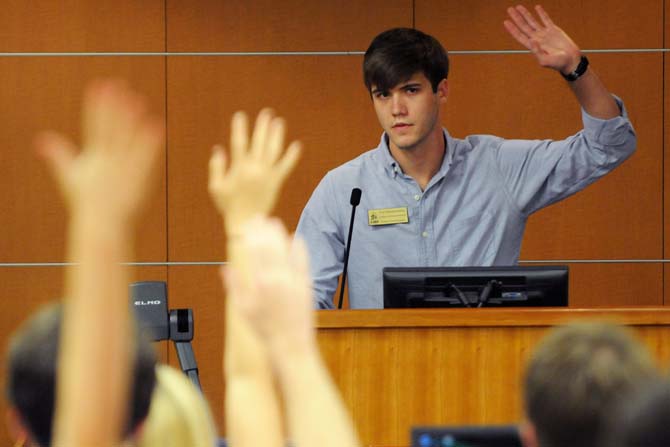The national election season may have come to a close Tuesday night, but the University’s election season is just starting to roll.
In my time here at the University, I have voted in every Student Government election. Other than that, I have not paid much mind to the doings of our SG, as I saw its motives, or the occasional lack of, to be petty and born mainly out of personal fluff.
It has become apparent that our SG is much its own clique that represents itself rather than the student body.
Plagued by students who seem to be unable to see farther than the end of their noses, SG — because of the lack of attention it commands from the student body — has been exploited by résumé builders and power-tripping try-hards.
Last year, a total of 6,528 students voted in our Student Government presidential election, followed by 4,953 in the run-off. At the University of Alabama, Matt Calderone was elected with 6,404 votes of out 10,115 total. At Vanderbilt University, 3,661 students voted out of their total student body of only 11,949. University of Florida students shelled out 10,644 votes.
What’s the deal here? Why can’t our SG draw the voters like other universities can? Do other universities do a better job of addressing significant issues?
Perhaps these other Southeastern Conference governments think outside the box of free Scantrons and the Freshman Leadership Council.
Many people see that SG — Senate members in particular — take their jobs too seriously. But no one cares because the Senate hardly passes any substantive legislation.
Former Business College Council President and E.J. Ourso College of Business Senator Stephen H. Breaud’s comments on his experiences in SG shed some peculiar light on the situation.
“[Student Government] had more drama than a group of high school freshmen,” he said. “It seemed like senators from different colleges would dedicate all of their free time to making new rules for Student Government that did not benefit their constituents in any way.”
SG President Taylor Cox said reports on SG should be sure to distinguish between legislative, executive and judicial branches, which is fair because the Senate seems to bear the brunt of the criticism.
A recent waste of time in the Senate would include the establishment of the Greek Caucus, and even as a Greek, I don’t believe having this caucus is a productive measure. Caucuses only create factions and in this case, the Greek community is being more alienated on a campus that already has a hard time getting along with it.
Some things have led me to believe that members and committees are enjoying their position titles much more than they are fulfilling them.
First, SG’s website is far from updated. The last featured news update was April 15, 2012. The last Senate meeting minutes posted are from Feb. 23, 2011.
Other over zealous areas include the executive branch with a large staff mainly comprised of assistant directors — sometimes double assistants — who themselves find trouble staying informed of what is actually going on within SG. It is evident the principles behind this are not based on necessity, but rather back scratching.
Consolidation of the executive branch would cut fat, reducing confusion and washing out the inefficiencies a bureaucracy brings.
The University needs a professional leadership community that is not obsessed with writing as much legislation as possible so as to fool themselves into believing they’re making a difference. There is a need for a unified leadership community that is a respectable liaison between the student body and the administration.
SG will find that once it starts representing its own 100-year tradition and the University with the prestige they deserve, that SG, as a whole, will climb real ladders and their résumés will precede them.
So, young bureaucrats, take this as a challenge to do something about this self-concerned entity that was established to be a service entity. Change something. Get outside of the “Sigma Gamma” clique and push for genuine initiatives — not personal agendas that you have convinced yourself other people are concerned about.





